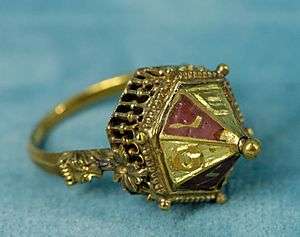Colmar Treasure
|
Jewish wedding ring. Chased and enameled gold and filigrees, early 14th century, found at Colmar (Alsace, France) in 1863 | |
| Material | Gold, silver, bronze, iron |
|---|---|
| Created | 14th century |
| Period/culture | Middle ages |
| Discovered | Colmar, Alsace, France, 1863 |
| Present location | Musée de Cluny |
The Colmar Treasure or Colmar hoard is a hoard of precious objects buried by Jews at the time of the Black Death.
History
The Treasure was found in 1863 in the wall of a house in the medieval rue des Juifs, in Colmar, Alsace. It is believed that some of the items were sold by the discoverers before the full extent of the Treasure could be recorded. The treasures that survive are mostly in the collection of the Musée de Cluny. It was fully published only in 1999, when exhibited in Colmar.[1]
The Treasure includes one of the few surviving examples of a Jewish marriage ring, with the bezel in the form of a small building instead of a precious stone, in accord with the requirement in Jewish law that wedding rings be made as one piece.
The Treasure includes silver coins, silver table ware, and gold and silver jewelry including elaborate belt buckles and fifteen silver rings.[2]
See also
References
- ↑ Treasures of the plague: Marian Campbell describes a remarkable discovery that throws a tragic light on Jewish life in 14th-century Europe, Sept, 2007, by Marian Campbell, Apollo
- ↑ In Laudem Hierosolymitani: Studies in Crusades and Medieval Culture in Honour of Benjamin Z. Kedar, by Iris Shagrir, Ronnie Ellenblum, Jonathan Simon Christopher Riley-Smith, Jonathan Riley-Smith, B. Z. Ḳedar Contributor Iris Shagrir, Ronnie Ellenblum, Jonathan Riley-Smith, Ashgate Publishing, Ltd., 2007, p. 277 ff.
